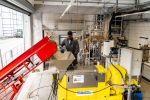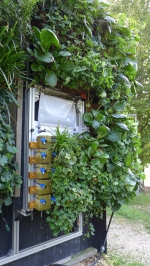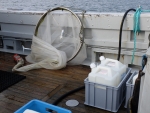-
-
Alternative construction materials: mycelium-based materials - 20/12/2023
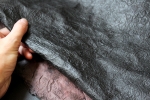
Most of us see fungi as just food - and possibly pathogens. This is a mistake, because these amazing organisms are capable of much more: they grow on plant residues of all kinds, forming a dense and interconnected structure as they spread. The resulting material can be moulded into desired shapes and be turned into new sustainable and economically attractive products such as leather and polystyrene substitutes or building materials.
https://www.biooekonomie-bw.de/en/articles/news/using-fungi-create-sustainable-and-economical-mycelium-based-materials
-
-
Sustainable binder alternative - 18/12/2023
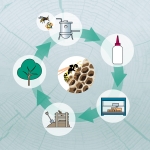
Plastic is all around us; and unfortunately, it is not going away any time soon. The search for more sustainable solutions is fully underway. However, binders that degrade only with difficulty or not at all are still used to bond natural materials such as wood and straw - not yet truly environmentally friendly. Fraunhofer researchers are working on an insect-inspired wood binder that makes bonded wood products both resistant and biodegradable.
https://www.biooekonomie-bw.de/en/articles/news/copied-insects-new-biological-wood-binder-under-development
-
urban BioEconomyLab - 07/12/2023
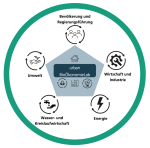
Baden-Württemberg is leading the way in the transition to a climate-neutral and sustainable economy. One of the projects undertaken is the Fraunhofer IGB’s "urban BioEconomyLab" project which aims to develop a transformation model and living laboratory to find bioeconomic solutions for the sustainable design of cities and municipal industry. What is new is that the IGB takes a systemic approach, focusing on biobased and circular value…
https://www.biooekonomie-bw.de/en/articles/news/city-living-laboratory-bioeconomic-sustainable-economic-area
-
-
The AlbLavendel project - 20/11/2023

Blue-violet, fragrant fields like those in Provence may soon become a common sight in the Swabian Alb. As part of the AlbLavendel project, the University of Hohenheim along with the company naturamus GmbH and the German Institutes of Textile and Fibre Research Denkendorf has started to investigate the cultivation of lavender, the production of essential oils and the use of distillation residues for producing textile fibres in the local region.
https://www.biooekonomie-bw.de/en/articles/news/swabian-lavender-cultivation-aesthetic-and-sustainable
-
-
Climate-neutral wastewater treatment plants thanks to patented real-time analytics - 08/11/2023
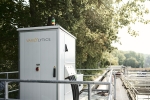
The wastewater industry is responsible for global greenhouse gas emissions equivalent to those of global aviation. The start-up Variolytics has found a way to significantly reduce greenhouse gases in wastewater treatment plants using real-time analytics. The patented sensor technology and AI-supported process optimisation offer multiple benefits: in addition to reducing nitrous oxide, the system helps to reduce energy costs and resources.
https://www.biooekonomie-bw.de/en/articles/news/using-ai-reduce-greenhouse-gases-wastewater-companies
-
Press release - 02/11/2023
The Sustainability Innovation Campus (ICN) initiated by the University of Freiburg and the Karlsruhe Institute of Technology (KIT), which will begin its work in January 2024, has announced a two-year funding programme for start-up projects. Scientists from the University of Freiburg, KIT and cooperating universities and research institutions are invited to submit their project outlines by 30 November 2023.
https://www.biooekonomie-bw.de/en/articles/pm/sustainability-innovation-campus
-
-
Wasser 3.0: #detect|remove|reuse - 31/10/2023
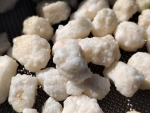
We all pollute our water with things we use in our everyday lives. In the process, microplastics and micropollutants accumulate in sometimes significant quantities and are difficult to remove. This has increasingly devastating consequences for our health and the environment. Wasser 3.0, a non-profit start-up from Karlsruhe, has declared war on this problem by developing a customisable process to detect, remove and even recycle these pollutants.
https://www.biooekonomie-bw.de/en/articles/news/how-sustainably-remove-and-recycle-microplastics-water
-
-
Microorganisms degrade biobased turf infill - 17/10/2023
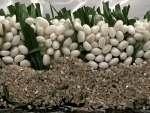
There are thousands of artificial turf pitches in Germany. They are extremely practical, but often not at all environmentally friendly. When it rains or the pitch is used, plastic particles from the rubber granules can be released into the envronment, where they remain. Researchers at the University of Stuttgart along with the company TECNARO are now developing an artificial turf with an infill that biodegrades as soon as it leaves the pitch.
https://www.biooekonomie-bw.de/en/articles/news/eco-friendly-artificial-turf-sports-pitch-s-good-people-and-environment
-
-
-
Preventing waste from instant meals - 05/10/2023
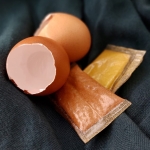
Many instant meals such as ramen soups have both a protective outer packaging and individual ingredients in small plastic sachets. To prevent this environmentally harmful waste, five students at the University of Hohenheim have developed a sustainable film based on eggshells and plant proteins that dissolves in hot water and is edible.
https://www.biooekonomie-bw.de/en/articles/news/edggy-edible-packaging-film-made-eggshell-waste
-
Press release - 29/09/2023
The European Parliament’s amendments to the proposal for a Regulation on Artificial Intelligence (AI) may be defined as a socio-ecological turnaround compared to the European Commission’s existing draft. The parliamentary draft proposes a series of environmental and climate-related provisions which, in the Oeko-Institut’s view, are feasible and technically achievable. The Oeko-Institut has reviewed these proposals in a Policy Paper.
https://www.biooekonomie-bw.de/en/articles/pm/ecological-alignment-artificial-intelligence
-
-
-
-
-
-
Food of the future: new production methods - 06/09/2023
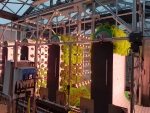
A rapidly growing world population and simultaneously rapidly shrinking arable land – these are just some of the major challenges facing the food industry. But how can solutions be found? Answers are being sought by the bioeconomy innovation space NewFoodSystems. Funded by the German Federal Ministry of Education and Research (BMBF), it is a network where science and industry can come together to develop sustainable food systems of the future.
https://www.biooekonomie-bw.de/en/articles/news/newfoodsystems-innovation-space-tomorrows-food
-
Press release - 30/08/2023
Rising sea levels due to climate change and artificial irrigation cause soil salinity to increase. This has a negative impact on agriculture, including viticulture. The plants die, yields decrease. Researchers of Karlsruhe Institute of Technology (KIT) have therefore studied a wild grapevine of higher salt tolerance. Their goal is to identify the genetic factors that make the grapevine resilient.
https://www.biooekonomie-bw.de/en/articles/pm/soil-salinity-wild-grapevine-defends-itself
-
-
-
-
-
-
-
-
-
-
-
-
-
-
-
-
-
Innovative materials - 14/06/2023

Conserving wood by producing furniture and other objects from wood-based materials with the help of microorganisms? That is exactly what a team of researchers from the University of Freiburg and the Leibniz Institute for New Materials (INM) in Saarbrücken is working on in the DELIVER project. The aim is to create a database of materials with a broad range of controllable properties for various applications that can be produced from wood waste.
https://www.biooekonomie-bw.de/en/articles/news/reinventing-wood-programmable-bacteria
-
-
-
-
3D-Thermocell project - 17/05/2023

Replacing plastic – for example in packaging – is not that easy but nevertheless urgently needed. In the 3D-Thermocell project, researchers at DHBW Karlsruhe are currently developing new plastic substitute products made of thermoformable paper as a renewable resource, which should be cheap and light and easy to dispose of along with waste paper. The characterisation and application of demonstration models will start soon.
https://www.biooekonomie-bw.de/en/articles/paper-instead-plastic-sustainable-packaging-good-conscience
-
Press release - 16/05/2023
This year's Venice Architecture Biennale sees itself as a "Laboratory of the Future". Bio-composites are not just dreams of the future in architecture. The German Institutes of Textile and Fiber Research (DITF) have developed a sustainable material for support profiles and connecting nodes, which will be on display at Palazzo Mora during the Biennale from May 20 to November 26.
https://www.biooekonomie-bw.de/en/articles/pm/bioverbundwerkstoff-auf-der-architektur-biennale-venedig
-
Diatoms as a biorefinery - 05/05/2023
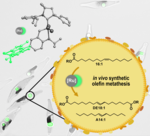
Renewable raw materials that can be used as alternatives to fossil resources already exist. However, to turn them into everyday products, plant oils and other renewable raw materials not only have to be extracted, but often have to undergo complex chemical processing. Researchers at the University of Konstanz have now converted microalgae cells into tiny refineries to produce and upgrade raw materials, creating a supply of sustainable chemicals.
https://www.biooekonomie-bw.de/en/articles/news/microalgae-sustainable-chemical-production-mini-factory
-
-
Website address: https://www.biooekonomie-bw.de/en/search
